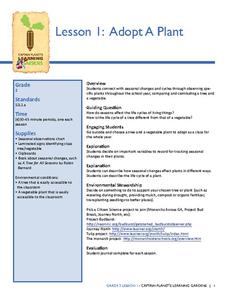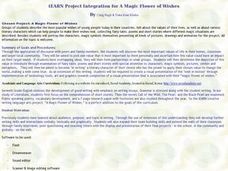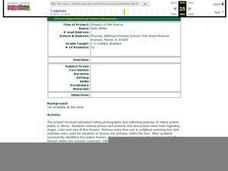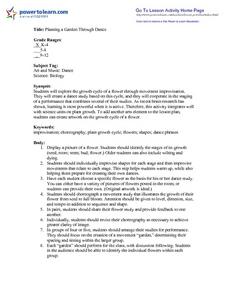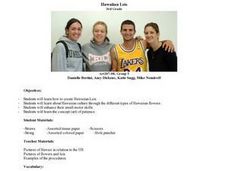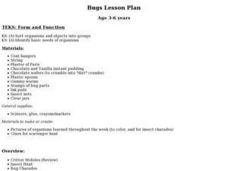Captain Planet Foundation
Adopt-A-Plant
Note the way that plants change during the season by adopting a plant on your school campus. After your class chooses their plant, they research the plant's needs, how it differs from other plants, find ways to support their plant's...
Curated OER
A Tisket-A-Tasket, Let?s Make a Flower Basket!!!
First graders practice blending words with the phonemes /i/ and /e/. Working with a specific groups of letters, 1st graders create words using the vowels i and e. they decode those words and read them repeatedly to increase fluency.
Curated OER
Flower Power
Students investigate and explain the basic needs and life processes of plants. Key concepts include: living things change as they grow and need food, water, and air to survive. The reverse of the Kansas quarter serves as inspiration.
Curated OER
A Magic Flower of Wishes
Students discuss which values are most important to them and their families. They read poetry and fairy tales to find a story that has the same value they find most important. They create a presentation and share it with the class.
Curated OER
Flower Power
Young scholars view examples of Robert Harris' artwork to identify and describe the ecosystems in them. In groups, they work together to discuss how ecosystems breakdown and create solutions to keep this from happening. To end the...
Curated OER
Tally Marks
In this tally marks worksheet, students identify and complete 10 different boxes by identifying various objects. First, they count the number of each object illustrate on the right. Then, they write the tally marks for the number in the...
Curated OER
Recording Wildflowers
In this wildflowers learning exercise, learners draw a wildflower and record its features. There are spots to record 8 different wildflowers, with 6 features about each one.
Curated OER
What Bees Eat
Young scholars study plant and animal interdependence by studying bees and pollination. In this interdependence instructional activity, students discuss flower parts and dissect it to show its reproductive parts. Young scholars then use...
Curated OER
Coevolution: A Simulation
Students participate in a demonstration in which they must attempt to suck liquid from varying containers with straws of varying sizes. They discuss the concept of coevolution and see why this activity illustrate the coevolution of...
Curated OER
Flowera of the Prairie
Young scholars with severe disabilities view pictures of flowers in a scanning box and identify them. Outside, they locate flowers on the school's property, label and care for them. Students use flower pictures to aid identification.
Curated OER
Photosynthesis With K'Nex
Students explore the process of photosynthesis. They create a diagram of photosynthesis, create a flower using K'NEX pieces and gears, and write a paragraph explaining how they would take care of their flower according to the process of...
Curated OER
Planting a Garden Through Dance
Students create a dance study based on the growth cycle of a flower. They improvise movements that relate to each stage of growth. They create artwork on the growth cycle of a flower. They perform their dances for the whole class.
Curated OER
Pollen & Pollination
Students identify the different ways things are pollinated and how to manage pollen. In this pollination lesson students complete an experiment on how moths pollinate flowers.
Curated OER
Classifying Monocot And Dicot Plants
Sixth graders identify the parts of a flower, and tell the difference between monocots and dicots. They group plant by leaf types and characteristics placing the information in table form on the computer.
Curated OER
Pollination
Fourth graders explore the pollination process. In this plant biology instructional activity, 4th graders dissect a flower to identify the parts of a flower and watch a video to see seed dispersal. Students write about the pollination...
Curated OER
A Seed for All Needs
Students identify uses for plants. In this agricultural lesson, students read the book Spring Gardening and distinguish between food plants and flowers. Students plant flower in cups as a follow-up activity.
Curated OER
Planting Phil's Garden
Students explore gardening. In this agriculture lesson, students plan and plant seeds according to the procedure modeled by a "master gardener." Flowers are distributed at a local retirement home.
Curated OER
Plant Pollination and Fertilization
Fourth graders research and apply knowledge about plant pollination and fertilization in this instructional activity. They color on a flower diagram the anther, the pistil, the pollen, the pollen tube, the ovary, and the egg to show the...
Curated OER
Hawaiian Leis
Third graders examine the Hawaiian culture through the different types of Hawaiian flowers and discover how to create Hawaiian Leis. Students make flowers out of tissue paper to create their leis.
Curated OER
Natural Refrigeration
Students build a refrigerator that does not require electricity. In this environmental science activity, student consider desert dwellers of Africa who have no access to electricity. Students use flower pots, sand and water to study the...
Curated OER
Counting Petals
Students solve addition and subtraction problems. In this problem solving lesson plan, students solve math problems written on flowers. Using petals as a counting aid, students demonstrate the answer by attaching the correct number of...
Curated OER
Matching Numbers
Students match numbers 1-5. In this matching numbers lesson, students count the spots on ladybugs. Students read the numbers written on flowers and determine where each ladybug should land.
Curated OER
Bugs Lesson Plan
Students complete a unit of lessons on insects. They participate in a bug hunt, construct paper flowers, discuss pollination, create bug paperweights and insect mobiles, play bug charades, and participate in a bug scavenger hunt.
Other popular searches
- Flowers for Algernon
- Flowers +Craft
- Planting Flowers
- Flowers Georgia O'keefe
- Abstract Flowers
- Edible Plants and Flowers
- Origami Flowers
- Drawing Flowers
- Botany Flowers
- Plants and Flowers
- Painting Flowers
- Parts of the Flowers


